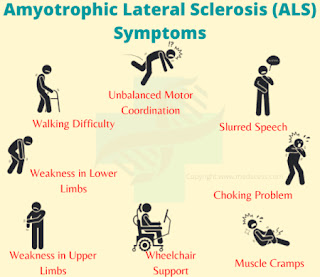1. Outline to ALS
2. Understanding ALS: What is it?
3. Types of ALS
- Sporadic ALS
- Familial ALS
4. Symptoms of ALS
- Early signs
- Progressive symptoms
5. Causes of ALS
- Genetic factors
- Environmental factors
6. Diagnosis of ALS
- Medical history and physical exam
- Electromyography (EMG)
- Other tests
7. Treatment options for ALS
- Medications
- Therapy
- Supportive care
8. Living with ALS
- Challenges and adjustments
- Support systems
9. Research and advancements in ALS
- Current studies
- Potential treatments
10. Coping strategies for patients and caregivers
- Emotional support
- Lifestyle changes
11. FAQs about ALS
- What is the life expectancy of someone with ALS?
- Can ALS be prevented?
- Is ALS contagious?
- How does ALS progress over time?
- Are there any famous individuals with ALS?
What is ALS and what are the symptoms and causes?
Amyotrophic Lateral Sclerosis (ALS), also known as Lou Gehrig's disease, is a progressive neurodegenerative disorder affecting nerve cells in the brain and spinal cord. This article aims to delve into the intricacies of ALS, exploring its symptoms, causes, diagnosis, treatment options, and more.
Introduction to ALS
ALS is characterized by the gradual degeneration and eventual death of motor neurons, leading to a loss of voluntary muscle movement. As the disease progresses, individuals may experience difficulty speaking, swallowing, and breathing, ultimately resulting in paralysis. Despite extensive research, the exact cause of ALS remains elusive.
Understanding ALS: What is it?
ALS is a complex neurological condition that affects the function of nerves and muscles. It primarily targets motor neurons, which are responsible for controlling voluntary muscle movements such as walking, talking, and chewing. As these neurons degenerate, the brain's ability to initiate and control muscle movement is compromised, leading to progressive muscle weakness and atrophy.
Types of ALS
There are two main types of ALS:
Sporadic ALS
Sporadic ALS is the most common form, accounting for approximately 90-95% of all cases. It occurs randomly and has no clear genetic link, making its exact cause uncertain.
Familial ALS
Familial ALS is inherited and accounts for the remaining 5-10% of cases. It runs in families and is caused by mutations in specific genes, such as the C9orf72 gene or the SOD1 gene.
Symptoms of ALS
ALS manifests through a variety of symptoms that may vary from person to person. These symptoms can be categorized into early signs and progressive symptoms.
Early signs
- Muscle weakness
- Difficulty walking or performing daily tasks
- Muscle cramps and twitching
- Slurred speech or difficulty swallowing
- Tripping or clumsiness
Progressive symptoms
- Difficulty breathing
- Paralysis
- Weight loss
- Cognitive changes
Causes of ALS
The exact causes of ALS are not fully understood, but research suggests a combination of genetic and environmental factors may contribute to its development.
Genetic factors
Approximately 5-10% of ALS cases are familial, meaning they are inherited from a family member who had the disease. Mutations in various genes have been linked to familial ALS, including the SOD1, C9orf72, and FUS genes.
Environmental factors
While most ALS cases occur sporadically without a clear genetic link, certain environmental factors may increase the risk of developing the disease. These factors include smoking, exposure to toxins, and traumatic injuries.
Diagnosis of ALS
Diagnosing ALS can be challenging due to its similarity to other neurological conditions. A comprehensive evaluation by a neurologist is typically required, which may include:
- Medical history and physical examination
- Electromyography (EMG)
- Nerve conduction studies
- Magnetic resonance imaging (MRI) or other imaging tests
Treatment options for ALS
Currently, there is no cure for ALS, but various treatment options can help manage symptoms and improve quality of life.
Medications
- Riluzole: the only FDA-approved medication for ALS, it may slow disease progression.
- Edaravone: an antioxidant medication that can help reduce the decline in physical function.
Therapy
- Physical therapy: helps maintain muscle strength and mobility.
- Speech therapy: assists with communication and swallowing difficulties.
- Occupational therapy: provides strategies to adapt to daily activities.
Supportive care
- Breathing assistance: devices such as ventilators or breathing masks may be used.
- Nutritional support: a balanced diet and supplements can prevent malnutrition.
Living with ALS
Living with ALS presents significant challenges for patients and their caregivers. Adapting to changes in mobility, communication, and daily tasks requires patience and support from loved ones and healthcare professionals.
Research and advancements in ALS
Ongoing research continues to explore potential treatments and therapies for ALS. From stem cell therapy to gene therapy, scientists are investigating innovative approaches to halt or reverse the progression of the disease.
Coping strategies for patients and caregivers
Managing the emotional and practical aspects of ALS is essential for maintaining a high quality of life. Strategies such as seeking emotional support, making necessary lifestyle adjustments, and engaging in meaningful activities can help individuals cope with the challenges of living with ALS.
Conclusion
ALS is a devastating disease that affects thousands of individuals worldwide. While there is currently no cure, advancements in research and treatment offer hope for improved outcomes in the future. By raising awareness, supporting ongoing research efforts, and providing compassionate care to those affected by ALS, we can work towards a world free from this debilitating condition.
FAQs about ALS
1. What is the life expectancy of someone with ALS?
- The average life expectancy after diagnosis is 2 to 5 years, although some individuals may live longer.
2. Can ALS be prevented?
- Currently, there are no known strategies for preventing ALS.
3. Is ALS contagious?
- No, ALS is not contagious and cannot be transmitted from person to person.
4. How does ALS progress over time?
- ALS typically progresses gradually, with symptoms worsening over time as motor neurons continue to degenerate.
5. Are there any famous individuals with ALS?
- Yes, notable figures such as physicist Stephen Hawking and baseball player Lou Gehrig were diagnosed with ALS.


Post a Comment